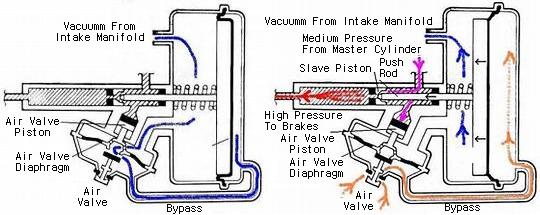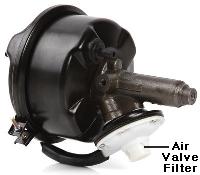The MGA With An Attitude
POWER BOOSTER, Remote, FAILURE MODES - BT-201M
Please review BT-201K about function of the remote brake booster. This article deals with various possible failures of the remote brake booster and how to deal with it.

As a questionable oddity, if you rest your foot gently on the brake pedal before starting the engine, when the engine starts and vacuum rises you may notice the brake pedal drop slightly. This is a normal function of the brake booster, and is not a problem (but it may be more pronounced if drum brake shoes are out of adjustment).
Failure of the seal between high and low pressure hydraulic chambers in the servo would allow high pressure fluid to leak back into the low pressure chamber until pressures equalize. That would result in reversion to manual brake function with no power assist.
Failure of the seal on the air valve piston or the seal on the servo pushrod would result in brake fluid being sucked from the master cylinder reservoir into the servo vacuum chambers. This would eventually drain the master cylinder reservoir resulting in loss of brake function. If you keep adding fluid to the master cylinder, the leaking fluid eventually fills up the vacuum chambers in the servo and can spill over into the vacuum pipe to the intake manifold where the fluid will be burned with engine combustion.
If you notice loss of brake function from loss of fluid, it is suggested that you pinch off the vacuum hose between intake manifold and servo to prevent fluid being sucked into the vacuum chamber of the servo. Then refilling the master cylinder may give you manual braking function enough to drive carefully to safe haven were you can get the servo repaired or replaced.
Failure of the air valve diaphragm would result in a vacuum leak that may adversely affect engine running quality. That vacuum leak would be most noticeable when you press the brake pedal with engine idling. A large enough air leak here may disable power boost reverting to manual hydraulic brakes.
Failure of the booster main diaphragm results in a very large and usually audible vacuum leak. This will definitely disable power boost reverting to manual hydraulic brakes, and will adversely affect engine running at low speed. The idling engine may stumble or die when you have the brakes applied, but may restart and run normally with brake pedal released. If driveability is a problem, you may pinch off the vacuum hose between intake manifold and servo to prevent stalling. Again, drive carefully to safe haven were you can get the servo repaired or replaced.

If the air valve filter gets clogged it may cause slow or delayed operation of the power servo. If the air valve poppet valve gets stuck in the actuated position when the air valve diaphragm retracts, it may cause the power booster to remain actuated, so the brakes do not release or are slow to release. You might notice this if you hold the brake pedal down while starting the engine, and when the pedal is released there may be a delay before the brakes release. The clogged filter and stuck poppet may be related as cause and effect, so either problem might be cured by cleaning the filter.
|